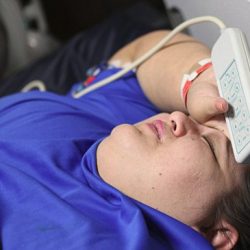The first MRI scan to show 'brown fat' in a living adult could prove to be an essential step towards a new wave of therapies to aid the fight against diabetes and obesity. Researchers from Warwick Medical School and University Hospitals Coventry and Warwickshire NHS Trust used a magnetic resonance imaging (MRI) based method to identify and confirm the presence of brown … [Read more...]
Weight Management News

Weight gain in children occurs after tonsil removal: A Study
Weight gain in children after they have their tonsils removed (adenotonsillectomy) occurs primarily in children who are smaller and younger at the time of the surgery, and weight gain was not linked with increased rates of obesity. About 500,000 children in the United States have their tonsils removed each year. The childhood obesity rate prompted reevaluation of the … [Read more...]
Bariatric surgery health benefits: A Swedish Study
Bariatric surgery has positive effects not only on weight loss but also on diabetes and heart disease. Researchers at the Sahlgrenska Academy and University of Cincinnati have shown that the health benefits are not caused by a reduction in the stomach size but by increased levels of bile acids in the blood. These findings, reported in Nature, indicate that bile acids could be a … [Read more...]
Food odors activate impulse area of the brain in obese children: A Study
The area of the brain associated with impulsivity and the development of obsessive-compulsive disorder is activated in obese children when introduced to food smells, according to a study being presented next week at the annual meeting of the Radiological Society of North America (RSNA). "In order to fight obesity, it is crucial to understand the brain mechanisms of odor … [Read more...]
Stored fat fights against the body’s attempts to lose weight: University of Cambridge Study
The fatter we are, the more our body appears to produce a protein that inhibits our ability to burn fat, suggests new research published in the journal Nature Communication. The findings may have implications for the treatment of obesity and other metabolic diseases. Most of the fat cells in the body act to store excess energy and release it when needed but some types of fat … [Read more...]
Expect changes in appetite, taste of food after weight loss surgery: A Study
Changes in appetite, taste and smell are par for the course for people who have undergone Roux-en-Y gastric bypass surgery during which one's stomach is made smaller and small intestines shortened. These sensory changes are not all negative, and could lead to more weight loss among patients, says Lisa Graham, lead author of a study by researchers from Leicester Royal … [Read more...]
Obesity can amplify bone and muscle loss: Florida State University Study
Florida State University researchers have identified a new syndrome called "osteosarcopenic obesity" that links the deterioration of bone density and muscle mass with obesity. "It used to be the thinking that the heavier you were the better your bones would be because the bones were supporting more weight," said Jasminka Ilich-Ernst, the Hazel Stiebeling Professor of … [Read more...]
Residing in high altitude military facilities protects service members from obesity: A Study
Overweight U.S. service members are 41 percent less likely to transition to clinical obesity when stationed at military facilities located at high altitude, according to a new study published today in the peer-reviewed journal, PLoS One. The quasi-experimental, retrospective study assessed the health records and migration patterns of nearly 100,000 enlisted service members … [Read more...]
Oft-assumed reasons for racial obesity disparities may not be only cause: University of Alabama Study
Racial disparities in obesity rates among the third of U.S. adults considered obese are often blamed on socioeconomic status because of its influence on diet and physical activity, but new findings from the University of Alabama at Birmingham published in Obesity suggest otherwise — particularly for women. Non-Hispanic blacks in the United States have the highest … [Read more...]
Long-term antibiotic treatment for Q fever causes weight gain: A French Study
Scientists have unearthed still more evidence that antibiotics can contribute to obesity. Research published ahead of print in the journal Antimicrobial Agents and Chemotherapy suggests that patients on long-term antibiotic treatment gained weight and had significant changes in their gut microbiota. The study, led by Didier Raoult, of Aix-Marseille University, Marseille, … [Read more...]
Obesity: Are lipids hard drugs for the brain?: A Study
Why can we get up for a piece of chocolate, but never because we fancy a carrot? Serge Luquet's team at the "Biologie Fonctionnelle et Adaptative" laboratory (CNRS/Université Paris Diderot) has demonstrated part of the answer: triglycerides, fatty substances from food, may act in our brains directly on the reward circuit, the same circuit that is involved in drug addiction. … [Read more...]
Obesity spells problems for trauma patients: American Academy of Orthopaedic Surgeons Study
A new study appearing in the November 18 issue of the Journal of Bone & Joint Surgery (JBJS) found a link between obesity and a higher risk for surgery in orthopaedic trauma patients. In addition, researchers found that patients with obesity had longer hospital stays and greater treatment costs. They were also more likely to be discharged to a care facility, rather than to … [Read more...]
Weight-loss surgery reduces sugar cravings: A Study
Weight loss surgery curbs the sweet tooth by acting on the brain's reward system, according to a study published November 19 in Cell Metabolism. The researchers found that gastrointestinal bypass surgery, which is used to treat morbid obesity and diabetes, reduced sugar-seeking behavior in mice by reducing the release of a reward chemical called dopamine in the brain. The … [Read more...]
Children born to women after bariatric surgery at higher risk of obesity and diabetes: American Physiological Society Study
Studies show that weight-loss surgery can boost fertility in women and reduce the risk of pregnancy complications that commonly occur in obese women, such as gestational diabetes and preeclampsia. While weight loss surgery improves the metabolic health of mothers, new findings to be presented at Cardiovascular, Renal and Metabolic Diseases: Physiology and Gender support that … [Read more...]
Food Order Sheds Pounds
If you are trying to control your blood sugar and ultimately shed pounds, new research shows you should pass the bread basket at the end of the meal-not before. It has been a tough battle, but 52-year-old Michael Vetter is finally winning at losing. “I’ve lost 50 pounds and I’ve been able to keep that off,” Vetter told Ivanhoe. From a high of 275 pounds, to a much … [Read more...]
Approach to accelerate metabolism could lead to new obesity treatment: Israeli Study
By manipulating a biochemical process that underlies cells’ energy-burning abilities, investigators at Beth Israel Deaconess Medical Center (BIDMC) have made a novel discovery that could lead to a new therapy to combat obesity and diabetes. Published in the April 10 issue of the journal Nature, the new findings show that reducing the amount of nicotinamide … [Read more...]
Obese people feel full sooner than people of normal weight: A Swiss Study
The number of people in the world who are obese has doubled since 1980. Attempts to halt the progress of this pandemic are reliant on more accurate knowledge of how obesity occurs. This is what a research group led by Christoph Beglinger at the University Hospital in Basel aimed to find out by comparing feelings of satiation among people of normal weight and those who are … [Read more...]
Depleting the gut microbiota protects from obesity: A Swiss Study
In the past few years, research on gut microbiota (that is, all microorganisms, mainly bacteria, inhabiting our gut) has started to unravel its tremendous role in our body, and how it symbiotically affects the functioning of our organs. In particular, microbiota has also an impact on the way calories are absorbed and how fat cells develop. By studying mice without microbiota, … [Read more...]
Over a lifetime, childhood obesity costs $19,000 per child: A Singaporean Study
Childhood obesity comes with an estimated price tag of $19,000 per child when comparing lifetime medical costs to those of a normal weight child, according to an analysis led by researchers at the Duke Global Health Institute and Duke-NUS Graduate Medical School in Singapore. When multiplied by the number of obese 10-year-olds in the United States, lifetime medical costs for … [Read more...]
Parental obesity and autism risk in the child: Whether paternal obesity a greater risk factor than maternal obesity: A Norwegian Study
Several studies have looked at possible links between maternal obesity during pregnancy and the risk of developmental disorders in the child. However, paternal obesity could be a greater risk factor than maternal obesity, according to a new study from the Norwegian Institute of Public Health. As the first researcher to study the role of paternal obesity in autism, Dr. Pål … [Read more...]
Mortality risks of being overweight or obese are underestimated: University of Pennsylvania Study
New research by Andrew Stokes, a doctoral student in demography and sociology in the School of Arts and Sciences at the University of Pennsylvania, suggests that many obesity studies substantially underestimate the mortality risks associated with excess weight in the United States. His study, "Using Maximum Weight to Redefine Body Mass Index Categories in Studies of The … [Read more...]
Severe obesity on the rise among children in the U.S: University of North Carolina Study
A new study led by a University of North Carolina School of Medicine researcher finds little to cheer about in the fight against childhood obesity, despite a recent report to the contrary. The study, published online first April 7 in JAMA Pediatrics, found that all classes of obesity in U.S. children have increased over the last 14 years. Perhaps most troubling, the study … [Read more...]
Weight loss efforts start well but lapse over time: A Study
Learning you have an obesity-related disease motivates many to start a weight loss program, but troubling health news is often not enough to sustain weight loss efforts, finds new research in the American Journal of Preventive Medicine. The study evaluated mostly male Veterans Affairs (VA) patients to uncover what motivated them to join the VA behavioral weight management … [Read more...]
Child’s obesity and cognitive function linked: University of Illinois Study
A University of Illinois study finds that obese children are slower than healthy-weight children to recognize when they have made an error and correct it. The research is the first to show that weight status not only affects how quickly children react to stimuli but also impacts the level of activity that occurs in the cerebral cortex during action monitoring. "I like to … [Read more...]
A protein could be key to fight obesity: American Physiological Society Study
More than one-third of people in the US are obese. Obesity and its related health problems -- including high blood pressure, high cholesterol, diabetes, insulin resistance, and belly fat -- affect so many, yet effective treatments are very few. In a new study, Simon Musyoka Mwangi and colleagues tested whether higher levels of a certain protein help fight the weight gain and … [Read more...]
Morning rays helps in Weight Loss: A Northwestern University Study
A surprising new strategy for managing your weight? Bright morning light. A new Northwestern Medicine® study reports the timing, intensity and duration of your light exposure during the day is linked to your weight -- the first time this has been shown. People who had most of their daily exposure to even moderately bright light in the morning had a significantly lower body … [Read more...]
Brain circuits involved in cravings: Dartmouth College Study
Dartmouth researchers studying rats have discovered that activation of designer neural receptors can suppress cravings in a brain region involved in triggering those cravings. The study is the first to systematically show how designer brain receptors and designer drugs work together to change how cues for food stimulate motivation. The findings, which may help scientists to … [Read more...]
Childhood obesity linked to poverty and parenting style: Concordia University Study
In 2013, 42 million infants and young children worldwide were overweight or obese. If current trends continue, that number will increase to 70 million by 2025, according to the World Heath Organization. It's not just genes that are the cause: socio-demographic and environmental elements are also contributing factors. Lower socio-economic status, living in neighbourhoods that … [Read more...]
Low energy sweeteners help reduce energy intake and body weight: University of Bristol Study
Use of low energy sweeteners (LES) in place of sugar, in children and adults, leads to reduced calorie intake and body weight -- and possibly also when comparing LES beverages to water -- according to a review led by researchers at the University of Bristol published in the International Journal of Obesity. For the first time, all available science was integrated into a … [Read more...]
Gastric bypass for teens: Weight loss and lipid improvements sustained 8 years after surgery: A Study
Eight years after having gastric bypass surgery as teenagers, patients continue to have significant weight loss and improvement in their lipid profiles. In a study to be presented Nov. 10 at the annual American Heart Association meeting in Orlando, researchers from Cincinnati Children's Hospital Medical Center found that body mass index decreased by 32 percent. In addition, the … [Read more...]
- « Previous Page
- 1
- …
- 11
- 12
- 13
- 14
- 15
- …
- 27
- Next Page »




























